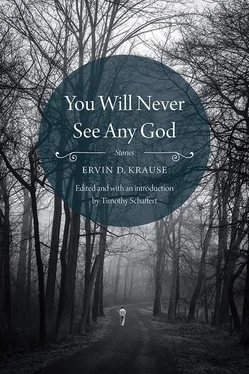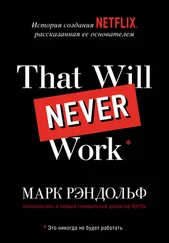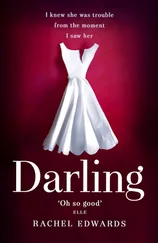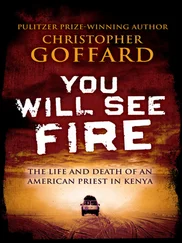He began to go under for moments and he did not want to lose consciousness, and he fought it, but gradually it overcame him and he would start into consciousness again and nothing would be changed. The sun hung in the same place, and the birds chattered and the breezes moved the top branches of the willows.
Two sparrows dropped from the trees and hung upon the hemp weeds, and their bright black eyes noted the man and forgot him, and the birds hit the pebbly wash of the ditch in a tangle of grayness and feathers, breeding. The female fled, but the male hopped with insolence almost to the man’s face before it too flew away. A while later the goldfinches came to the ditch and they pecked at the foxtail seeds. They clawed at the weeds and they ate and left.
The man prayed. He tried to remember some of the prayers he’d learned long before, but even the common prayer that began with “Our Father” did not come back to him, and he said to himself, dear god, dear god, bring me water, let it rain. He heard himself murmuring, highpitched and laboring, and he said, let the others find me. Let me have water, god.
When he looked again, the sun had visibly lowered, but it was no cooler. He thought perhaps he might have slept, for his head was clearer and he remembered many things. His legs did not pain so badly and he could actually raise himself on his elbow without the pain in his chest preventing it. The puddle of gasoline was still there beside him, and it was widening, and he noticed a different coloration, that the liquid was redder and thicker, and it came to him that he was bleeding, that he had been losing that steady trickle of blood all day and his blood and the gasoline were collecting there in front of him.
He was enraged suddenly, and he wanted to weep in his terrible anger. He pressed with all his strength against the hot wheel of the tractor, but nothing moved. He struck at the red steel of the tractor, and the metal was too hot to touch. The metal was foreign and alien there, burning and glistening, and there he was, he thought in his fury, caught beneath the machine, pinned by the hot, unwholesome metal into the earth, and he could not do anything at all. He beat at the metal until his hands began to bleed again, and it was no use. The hot steel of the tractor was shiny and undented.
The man cursed the machine. The tractor was an enemy to him, he thought, it had thrown him and trapped him, and it would not help him. It had been the tool to say, I give thee death. It had conspired to crush him, it and the sun. And yet, he thought, when the ineffectual struggle was finished, when he lay back again, and yet, the machine was only part of it, for the hostile earth, the sliding bank and the hard, pebbly wash pinned him there, too, and there was the hostile sun, and the blue-burner sky. He was a fool, he thought, there was nothing hostile there, nothing had conspired against him, the world was unchanged. There was really no concern with these things around him, with these things that led him to death, there was only disconcern and utter detachment. He was the alien, the hostile one, there. The land and the things that grew from the land, and the metal sky and the hot sun, and even the machine, fashioned by hands not unlike his, none of them had any concern, and even though he was wedded to that soil, pinned by the earth and the machine, and his blood mixed with the blood of the tractor, he had no connection with anything there. The units were detached; he was alien; he was alone. And he would die as he had lived. It was a terrible realization.
He felt the warm rubber tire, the same tire that pinned him there. The tractor will be all right again, he thought, they will lift the machine and drain it and clean it thoroughly and fill it with fuel and it will run as well as ever; life is not a part of it, it cannot be crushed. He remembered the pride he had had with it, and how he had loved to run this tractor and how he had talked of the work it could do, and how things were better because of this machine. And now only the machine would ever be good again, even if they now lay dead like this together, and the blood ran out of them both and mixed in the gravel beside them.
He turned his face away from the tractor. The sun beat down. The butterflies swarmed, the birds fought and screamed, the breeze touched the languid treetops.
The sun had set itself on the rim of the ditch when the deerflies struck him. They came buzzing suddenly and they tangled in his hair and found his ears to burrow into and they struggled into his nostrils and bit sharply and angrily. The man moved his hands feebly against the flies. He had lost all of his strength, he thought, and then he remembered the bloating, fly-infested bodies of animals he had seen dead in fields, and how the maggots were working almost before the carcass was cool. He thought how it would be to find him like that, green and with the worms lacerating his face, and he fought against the flies, but they were inexorable and angry. The man became furious too, and he struck at them, and then he dug at the dirt and he covered his skin and his head with dust and crumbs of dirt. The flies persisted, but the man covered himself finally, and he lay beneath the gentle and cool layer of dust, with his hand over his nostrils, and the flies left gradually, and he was alone again.
The sun watched him lingeringly and moved with slowness beyond the edge of the bank. It was cool then, suddenly. The evening clouds came up, with the color of wine. The birds shrilled and worked high after mosquitoes. The butterflies were gone; they had gone with the sun. And there was the scurry of small animals in the weeds.
The flakes in his skull were falling rapidly now, he thought, there was no feeling in him anymore, it was as if the weight of the tractor was already off him, as if there was no machine, no life, no light, nothing around him; the world was settling in his flaking-off brain.
There was a padding sound near him and he saw the lean coyote slip along the bed of the ditch, and the coyote sniffed at the straw hat and it turned the hat, and the light wind rolled the hat very near the man, almost to his head. The coyote saw the man then and it came up, sniffing gingerly. The coyote had eyes that were yellow-green and the eyes burned in the darkness like oil, and the animal came to sniff at the dust-covered and swollen strangeness, and it brought its wet nostrils to within an inch of the man’s. The coyote backed away and it began to pant lightly, and it scratched itself, leisurely, and then its head came up, alert, and the animal turned and slipped away, without sound.
The man thought he heard voices and shouts and footsteps and he looked up. No, he had been dreaming, he thought, and he turned his body quite easily. He recalled the yellow-green eyes, like fire, and he wondered if he had dreamed that too. His hand flung out and he touched moisture, and his mouth gagged after water, and it took him a thrilling instant to realize it was the gasoline puddle beside him. It was thick now, and coarse with blood.
The night came on blackly, the stars were out, and the locusts and crickets buzzed with violence near beside him. The moon rose above the ditch, and it was enormous and flattened and gold. The eyes and the mouth of it were agonized and lamenting. The man was glad when he saw the moon. The moon is my sister, he thought. The flakes within his skull were falling upon his eyes, and he thought of someone or something bringing him water. Overhead, the wind-swayed willows made scratches against the terrible moon.
I was looking for stray calves that wind-whipped, violently cold morning. The cattle were in the yards, but there were two missing and so I went out across the stubble fields to look for them, while my brother, who owned that farm, finished the morning work. The snow was deep in the fields; it had started to snow lightly during the afternoon of the previous day, in flurries at first, and during the night it had come heavily, with a high wind, and it was drifted and banked with an ice-hard covering.
Читать дальше











